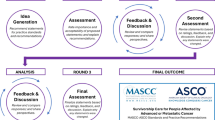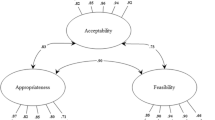Abstract
Purpose
We describe a descriptive qualitative study with the purpose of assessing the feasibility of developing an integrative oncology program in our region.
Methods
We conducted 39 interviews and two focus groups (n = 20) with cancer patients, their caregivers and complementary and conventional (n = 15) healthcare professionals.
Results
One primary theme emerged, acceptance or tolerance of an integrative oncology program, which represents concepts within four emergent categories: (1) operational model; (2) values to guide an integrative oncology program; (3) physical location and design; and (4) facilitators and barriers to establishing an integrative oncology program.
Conclusions
The study was instrumental in establishing support for an integrative oncology program in our region, including a feasible model. Based in part on the results of this study, the Ottawa Integrative Cancer Centre (www.oicc.ca) opened in November 2011. We recommend a similar process of stakeholder engagement for others who wish to develop an integrative program in their location.

Similar content being viewed by others
References
Balneaves LG, Bottorff JL, Hislop TG, Herbert C (2006) Levels of commitment: exploring complementary therapy use by women with breast cancer. J Altern Complement Med 12(5):459–466
Eng J, Ramsum D, Verhoef M, Guns E, Davison J, Gallagher R (2003) A population-based survey of complementary and alternative medicine use in men recently diagnosed with prostate cancer. Integr Cancer Ther 2(3):212–216
Gansler T, Kaw C, Crammer C, Smith T (2008) A population-based study of prevalence of complementary methods use by cancer survivors: a report from the American Cancer Society's studies of cancer survivors. Cancer 113(5):1048–1057
Mao JJ, Palmer CS, Healy KE, Desai K, Amsterdam J (2011) Complementary and alternative medicine use among cancer survivors: a population-based study. J Cancer Surviv 5(1):8–17
Molassiotis A, Fernadez-Ortega P, Pud D, Ozden G, Scott JA, Panteli V et al (2005) Use of complementary and alternative medicine in cancer patients: a European survey. Ann Oncol 16(4):655–663
Deng G, Frenkel M, Cohen L, Cassileth BR, Abrams DI, Capidice JL et al (2009) Evidence-based clinical practice guidelines for integrative oncology: complementary therapies and botanicals. J Soc Integr Oncol 7(3):85–120
Brazier A, Balneaves LG, Seely D, Stephens J, Suryaprakash N, Taylor-Brown J (2008) Integrative practices of Canadian oncology health professionals. Curr Oncol 15(Suppl 2):s110.es87–91
Ben-Arye E, Schiff E, Steiner M, Keshet Y, Lavie O (2012) Attitudes of patients with gynecological and breast cancer toward integration of complementary medicine in cancer care. Int J Gynecol Cancer 22(1):146–153
Diehl V (2009) The bridge between patient and doctor: the shift from CAM to integrative medicine. Hematology Am Soc Hematol Educ Program 1:320–325
Frenkel M, Cohen L, Peterson N, Palmer JL, Swint K, Bruera E (2010) Integrative medicine consultation service in a comprehensive cancer center: findings and outcomes. Integr Cancer Ther 9(3):276–283
Seely D, Weeks L, Young S (2012) A systematic review of integrative oncology programs. Curr Oncol 19(6):e436–e461
Cassileth BR, Vickers AJ (2004) Massage therapy for symptom control: outcome study at a major cancer center. J Pain Symptom Manage 28(3):244–249
Stephen JE, Mackenzie G, Sample S, Macdonald J (2007) Twenty years of therapeutic touch in a Canadian cancer agency: lessons learned from a case study of integrative oncology practice. Support Care Cancer 15(8):993–998
Rosenbaum E, Gautier H, Fobair P, Neri E, Festa B, Hawn M et al (2004) Cancer supportive care, improving the quality of life for cancer patients. A program evaluation report. Support Care Cancer 12(5):293–301
Frenkel M, Cohen L (2008) Incorporating complementary and integrative medicine in a comprehensive cancer center. Hematol Am Soc Hematol Educ Program 22(4):727–736
Richardson MM, Babiak-Vazquez AE, Frenkel M (2008) Music therapy in a comprehensive cancer center. J Soc Integr Oncol 6(2):76–81
Gould D (2001) Hyperthermia and electrochemical therapy at St. Georg Hospital, Germany: Friedrich Douwes, M.D'.s, innovative, integrative cancer care. Altern Complement Ther 7(5):291–295
Mackerth PP (2004) Complementary and alternative therapies in cancer care: greater evidence and greater organization of provision. Eur J Oncol Nurs 8(1):1–2
Brazier A, Cooke K, Moravan V (2008) Using mixed methods for evaluating an integrative approach to cancer care: a case study. Integr Cancer Ther 7(1):5–17
Peace G, Manasse A (2002) The Cavendish Centre for Integrated Cancer Care: assessment of patients' needs and responses. Complement Ther Med 10(1):33–41
Seers H, Gale N, Paterson C, Cooke HJ, Tuffrey V, Polley MJ (2009) Individualised and complex experiences of integrative cancer support care: combining qualitative and quantitative data. Support Care Cancer 17(9):1159–1167
Harrington JE, Baker BS, Hoffman CJ (2012) Effect of an integrated support programme on the concerns and wellbeing of women with breast cancer: a national service evaluation. Complement Ther Clin Pract 18(1):10–15
Balneaves LG, Truant T, Verhoef M, Ross B, Porcino A, Wong M et al (2012) The Complementary Medicine Education and Outcomes (CAMEO) program: a foundation for patient and health professional education and decision support programs. Patient Educ Couns 89(3):461–466
Sierpina VS, Kreitzer MJ, Cunningham AJ, Elder WG, Bruckner G (2007) Innovations in integrative healthcare education: a healing journey for cancer patients in Ontario and an online interdisciplinary CAM course for allied health students in Kentucky. Explore (NY) 3(4):423–425
Pope C, Mays N (1995) Reaching the parts other methods cannot reach: an introduction to qualitative methods in health and health services research. BMJ 311(6996):42–45
Morse J, Richards L (2002) Readme first for a user's guide to qualitative research. Sage Publications, Thousand Oaks, CA
Berg B (2003) Qualitative research methods for the social sciences. Allyn and Bacon, New York
Creswell JW (2009) Research design: qualitative, quantitative, and mixed methods approaches, 3rd edn. Sage Publications, Thousand Oaks, CA
Miles M, Huberman AM (1994) An expanded sourcebook: qualitative data analysis. Sage Publications, Thousand Oaks, CA
Cohen DJ, Crabtree BF (2008) Evaluative criteria for qualitative research in health care: controversies and recommendations. Ann Fam Med 6(4):331–339
Acknowledgements
The authors thank Sarah Young for her valuable help managing the interview process, including conducting some of the participant interviews. We also thank Jodi Peters for her work in transcribing the interview and focus group discussions. This study was funded by the Lotte & John Hecht Memorial Foundation. The funder had no role in study design, data collection, analysis or interpretation, manuscript writing, or in the decision to submit the manuscript for publication.
Conflict of interest
None of the authors have a financial relationship with the sponsor of this research. Further, the authors maintain full control of the data and agree to allow the journal to review the data if requested.
Author information
Authors and Affiliations
Corresponding author
Additional information
Relevance
The study described in this manuscript will be of relevance to program planners, administrators, policy makers and other cancer care professionals. It highlights an increasing acceptance of the integration of complementary therapies into mainstream cancer care, and a rigorous methodological approach to program development we followed to ensure buy in from a range of stakeholders. In this manuscript we outline a program for integrative oncology that is feasible and acceptable to stakeholders in our region. The outlined program could serve as a foundation for integrative oncology program development in other jurisdictions.
Rights and permissions
About this article
Cite this article
Weeks, L., Seely, D., DeGrasse, C. et al. Developing an operational model for an integrative oncology program: a qualitative descriptive feasibility study. Support Care Cancer 22, 731–739 (2014). https://doi.org/10.1007/s00520-013-2028-8
Received:
Accepted:
Published:
Issue Date:
DOI: https://doi.org/10.1007/s00520-013-2028-8




